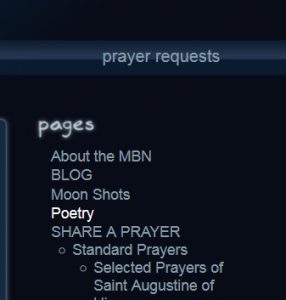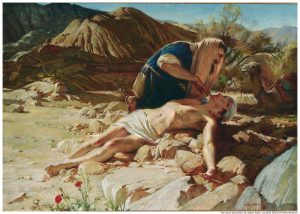 Read it online here, please. And please, when you visit there, use one of the social media links at the bottom of the page to share this post. Thank you! And remember, we now have a READER VIEW available, so share this link or this email often.
Read it online here, please. And please, when you visit there, use one of the social media links at the bottom of the page to share this post. Thank you! And remember, we now have a READER VIEW available, so share this link or this email often.
Please take a moment – or two – to use this link to view the new Poetry Page. It’s in the upper right column in the Pages List. Much appreciation to Ryan and Kate Wilmot and Svetoslav Sabev for their support, help, and guidance in achieving this dream!
A quick personal update. I had my right hip replaced 5/7/18. I now have one thigh that looks like it belongs to a linebacker! It’s painful, but bearable. I’m focusing on getting through PT with a positive attitude so I can have the other one done within the year. Thank you again for your prayerful support. It’s a big help I assure you!
Since sitting for long periods is not a good idea, I’m going to pull out an Ace and use material a Guest Contributor today, John Kretser, a long-time friend, mentor, and fellow laborer in the harvest. John sent me this message back when I was having shoulder problems and was weighing the possibility of having to use speech recognition to dictate my posts. That didn’t happen, fortunately, thanks to a great physical therapist named Todd Strong. Enough introductions! On with the message and John, MAHALO NUI LOA!
Bridges
“Like a bridge over troubled water I will lay me down.” Paul Simon
John 13:34 “A new commandment I give to you, that you love one another; as I have loved you, that you also love one another. 35 By this all will know that you are My disciples, if you have love for one another.”
Have you ever considered the impact of a broken bridge?
In 1987 spring arrived early in upstate New York. The snow melted quickly with the onset of unseasonably warm weather in March. Then, for ten days straight the skies opened up and heavy rain fell steadily on the already saturated soil of the hills and valleys of the Catskills and Mohawk Valley, transforming normally gentle rivers and streams into raging torrents of muddy water. In the pre-dawn hours of April 5th, just a few miles west of the  city of Amsterdam, the relentless assault of the surging floodwaters undermined the foundation (a condition called “bridge scour”) and a thirtyfive-year-old bridge gave way, crumbling and tumbling into the swollen, angry Schoharie Creek. As a result, Interstate 90, a.k.a. the New York State Thruway, that major four-lane route spanning the Empire State from border to border was no longer the unbroken ribbon of concrete and asphalt it had always been since it was completed in the mid-1950’s.
city of Amsterdam, the relentless assault of the surging floodwaters undermined the foundation (a condition called “bridge scour”) and a thirtyfive-year-old bridge gave way, crumbling and tumbling into the swollen, angry Schoharie Creek. As a result, Interstate 90, a.k.a. the New York State Thruway, that major four-lane route spanning the Empire State from border to border was no longer the unbroken ribbon of concrete and asphalt it had always been since it was completed in the mid-1950’s.
Only a few hours earlier Elton and Sarah Richards, homebound for Chicago, had bidden their daughter and her family an emotional, reluctant farewell, with many loving hugs, kisses and tears, following a pleasant vacation and family reunion in Hartford, Connecticut. Everyone was already looking forward to getting together again at Christmas time.
In the swirling mists, darkness and drizzling rain, it was unlikely that Elton was aware of the breech over the Schoharie until the very last instant when his sedan suddenly ran out of pavement and plunged off the highway, plummeting through 120 feet of naked space into the turbulent waters churning below, even as Sarah’s terrified screams were swallowed up in the damp darkness. The Richards were not to be the only victims. Before authorities would learn of the bridge collapse and could erect barricades on the site, eight more souls would join the Richards in a watery death on that terrible Sunday morning.
For me, learning of this tragedy had great impact because I was able to easily visualize the location which was near where I grew up and the site was familiar. The bridge, over which I had traveled numerous times, was located at the bottom of a long, steep hill where Schoharie Creek flowed into the Mohawk River which paralleled I-90
Bridge failures, of course, have happened before and since. Remember the earthquake at LA and the bridge collapse over the Mississippi in Minneapolis in 2007?
Actually, fortunately, bridge failures are rare events. However, what makes them memorable is the sudden, spectacular and devastatingly tragic impact they bear on people’s lives when they do happen. Ironically, another truth is that bridges are, for the most part, taken for granted, that is, of course, UNTIL they fail.
We have been talking about physical bridges made of wood, stone, steel and concrete but, what about the emotional “soul-bridges” in our lives?
However, where bridges of concrete and steel connect roadways over rivers, ravines and swollen streams, soul-bridges are the relationships spanning the space between hearts and minds, keeping us safely above such hazards as sorrow, anger, bitterness, fear and despair. Soul-bridges are just as important to our well-being as their steel and concrete counterparts. The condition of soul-bridges reflect the integrity of our relationships with one another and the care and attention we invest in them.
After the collapse of the Schoharie Bridge, the report from the New York State Thruway Authority cited “poor maintenance” coupled with “severe stress” on the foundation of the structure as the reason for the bridge’s failure. So, even though the bridge failure manifested in a catastrophic manner, various forces together with neglect had been working for as long as 30 years leading to the failure which had only the appearance of sudden, unforeseen disaster.
In a similar manner, I think it is fair to ask, “What happens when we abuse our soul-bridges through “poor maintenance” and “severe stress”? How about damage, sometimes irreparable, between any two or more people but experienced most commonly with spouses, friends, family, co-workers and business associates?
 Haven’t we all learned the price of “bridge abuse” to one degree or another? The most common outcome of soul-bridge/relationship abuse is seldom a total collapse or closure. Rather it is the establishment of emotional barriers which impose cost, inconvenience, stress and, plain old difficulty in our relationships. One day there was a beautiful, shimmering span between two hearts joined together in a satisfying relationship characterized by harmony, purpose and happiness. Abuse, deliberate or unintentional, takes place. The next day, to our dismay, what had been a bridge with unrestricted access to the other person or persons now features an ugly toll booth, complete with the emotional equivalents of gates, dogs, and armed guards. Restoration becomes a long and painful process and even then, the relationship will probably never be what it once was. Even with an appeal under a white flag, some relationships are never restored or even given a chance to be restored. All these outcomes are all but assured. How dismal, sad…..
Haven’t we all learned the price of “bridge abuse” to one degree or another? The most common outcome of soul-bridge/relationship abuse is seldom a total collapse or closure. Rather it is the establishment of emotional barriers which impose cost, inconvenience, stress and, plain old difficulty in our relationships. One day there was a beautiful, shimmering span between two hearts joined together in a satisfying relationship characterized by harmony, purpose and happiness. Abuse, deliberate or unintentional, takes place. The next day, to our dismay, what had been a bridge with unrestricted access to the other person or persons now features an ugly toll booth, complete with the emotional equivalents of gates, dogs, and armed guards. Restoration becomes a long and painful process and even then, the relationship will probably never be what it once was. Even with an appeal under a white flag, some relationships are never restored or even given a chance to be restored. All these outcomes are all but assured. How dismal, sad…..
UNLESS…. We find a foundation with a strength and power that surpasses pride and hurt feelings, neglect and carelessness, in short, the full array of human shortcomings.
And, now, something that may be a bit of an earth-shaker for some: The most important teaching of Jesus, evident throughout New Testament Scripture, was not on holiness, righteousness, obedience or even faith. Rather, it was on relationships (soul-bridges): first – between God and people, and secondly, and perhaps more urgently, between people. Please note: the terms “bridge”, “soul-bridge” and “relationship”, like the word “trinity” are not found, per se, anywhere in any literal translation of the Bible. However, as we know, the concept is ever-present and found ubiquitously.
Therefore, consider the exchange between Jesus and religious authorities from the temple in Jerusalem:
Mark 12: (Also, found in Matthew 22 and Luke 10) 28 Then one of the scribes came, and having heard them reasoning together, perceiving that He had answered them well, asked Him , “Which is the first [NOTE: the word “first” in the Greek is πρῶτος, pronounced pro’-tos and meaning, per Vine’s Dictionary: Best, Chief, Chiefest, Chiefly, First, Former, Principal (most important)] commandment of all?” 29 Jesus answered him, “The first of all the commandments is: ‘Hear, O Israel, the LORD our God, the LORD is one. 30 And you shall love the LORD your God with all your heart, with all your soul, with all your mind, and with all your strength.‘ This is the first commandment. 31 And the second, like it, is this: ‘You shall love your neighbor as yourself.’ There is no other commandment greater than these.”
In Matthew 22:40, Jesus goes even further, declaring – “On these two commandments hang all the Law and the Prophets.” Translation, “If everyone observed only these two commandments with all their heart, mind, soul and strength, no other laws, including the “Big 10” and all the directives of the prophets would be needed.” Go ahead – test the concept for yourself.
Examples: If we truly loved God, would we profane His name or make up another God to worship? If we were to love our neighbor as our self and our neighbor includes our spouse would we commit adultery? In the same manner would we lie, steal or murder?
Note that both the first and second (in importance) commandments here describe relationships, i.e. between God and people (love God), between people (love your neighbor). Okay, I can hear some of you thinking, “What! How can he say “people” where the Bible said “neighbor”? Anyway, what does Jesus and the Bible mean by “neighbor”?
 Glad you asked! For the answer, let’s go to the same scene in the Gospel of Luke, Chapter 10, which varies from the story found in Matthew and Mark in one respect – where a “certain lawyer”, or scribe, asked Jesus, seeking to “justify himself”, in verse 29, “And who is my neighbor?” Jesus’ response made it clear as He then taught through the Parable of the Good Samaritan, that a “neighbor” is anyone, including enemies, aliens and strangers.
Glad you asked! For the answer, let’s go to the same scene in the Gospel of Luke, Chapter 10, which varies from the story found in Matthew and Mark in one respect – where a “certain lawyer”, or scribe, asked Jesus, seeking to “justify himself”, in verse 29, “And who is my neighbor?” Jesus’ response made it clear as He then taught through the Parable of the Good Samaritan, that a “neighbor” is anyone, including enemies, aliens and strangers.
Now, let’s back up a few verses to Luke 10:25 for more information in order to frame the whole passage pertinent to our discussion about soul-bridges and “bridge abuse” – And behold, a certain lawyer stood up and tested Him, saying, “Teacher, what shall I do to inherit eternal life?” The question was a sarcastic challenge from what was, in those days among the Jewish people, a professional holy person. It was not an honest question seeking truth. We might say that the lawyer/scribe was attempting to undermine the “bridge” Jesus was building. Jesus’ answer, however, was honest, “full of grace and truth” (John 1:17), both for that lawyer and us, today. Remember what Jesus taught His disciples regarding this issue in Matthew 5:20 “For I say to you, that unless your righteousness exceeds the righteousness of the scribes and Pharisees, you will by no means enter the kingdom of heaven.” This is a matter of eternal consequences! We would do well to heed Jesus’ words. In a proverbial nutshell, the point of all this boiled down and summarized, is that from God’s perspective, relationships (soul-bridges) are more important than the Law regardless of whether it is God’s Law, which is perfect, or man’s law, which is NOT!
This teaching in Luke is in agreement, affirming the many other teachings of Jesus concerning relationships, of which one of the most explicit is found in the Sermon on the Mount”, specifically, Matthew 5:43-48. The NLT version renders the teaching as follows: 43 “You have heard the law that says, ‘Love your neighbor’ (a relationship) and hate your enemy (a relationship). 44 But I say, love your enemies (a relationship)! Pray for those who persecute you! 45 In that way, you will be acting as true children of your Father (a relationship) in heaven. For he gives his sunlight to both the evil and the good, and he sends rain on the just and the unjust alike (a relationship). 46 If you love only those who love you (a relationship), what reward is there for that? Even corrupt tax collectors do that much. 47 If you are kind only to your friends (a relationship), how are you different from anyone else? Even pagans do that. 48 But you are to be perfect, even as your Father in heaven is perfect.” (Relax! The word “perfect”, here, in the Greek carries the meaning complete, not flawless.)
As long as I am pressing a point, let me press a few more! This passage follows other teachings of Jesus in the same Sermon on the Mount that are all about relationships:
- 21 – Jesus teaches murder and anger are the same.
- 27 – Jesus teaches adultery and lust are the same.
- 31 – Jesus teaches that divorce is a sin against marriage.
- 33 – Jesus teaches God’s approval of integrity and honesty with others.
- 38 – Jesus teaches kindness and gentleness versus payback and resentment.
Are we beginning to see how “the light that has come into the world”? (John 1:4-9) And, while we are in John, let us consider what may be the ultimate declaration of Jesus concerning relationships, one with which we are all very familiar – For God so loved the world that He gave His only begotten Son, that whoever believes in Him should not perish but have everlasting life. In short, this verse may be restated (not improved) in four relational parts: 1. God loved, 2. God gave, 3. We believe, 4. We receive.
It’s all about relationships!
Because we are created in God’s image, bridge building tends to be a natural, almost instinctive process. With each person we meet or speak a new bridge is built. If we stop to think about it, we realize that there are several under construction in our lives right now. Certainly, there are hundreds we have already created and no doubt there are a few we have destroyed or allowed to come to ruin or disrepair on the highway of life behind us that we may never be able to cross again.
The soul-bridges of our lives have the ability to support the full measure, or lack of, peace and joy we will know in this world if we commit to caring for them as we follow the way Christ has revealed to us in His WORD.
Whenever we communicate or interact with others let us pledge to visualize a bridge us and pay close attention to the character, quality and condition of the bridge. Let us further resolve that no relationship is too small or too casual to justify ignoring, misusing or abusing.
Beloved – If a bridge is built on the firm foundation of God’s principal laws of love, then the pillars of trust and respect, supported by the cables of honesty, held together with the cement of gentle understanding and mortar of love, the bridge will always, always, always remain a viable, reliable span that nurtures and sustains the souls on either end, free of anxiety and stress. The bonus? Two – we keep Jesus’ commandment, securing our citizenship in the Kingdom of God and fulfill the Great Commission, which becomes an effortless action. John 13:34 “A new commandment I give to you, that you love one another; as I have loved you, that you also love one another. 35 By this all will know that you are My disciples, if you have love for one another.”
Unless otherwise noted, all scripture given is from the New King James Version.
Take care – God bless. PJK
Whatever, whenever, wherever, whoever, however, if ever, forever — at your service, Belovéd! Thanks again, John!

Aloha Friday Messages by Charles O. Todd, III is licensed under a Creative Commons Attribution-ShareAlike 3.0 Unported License










